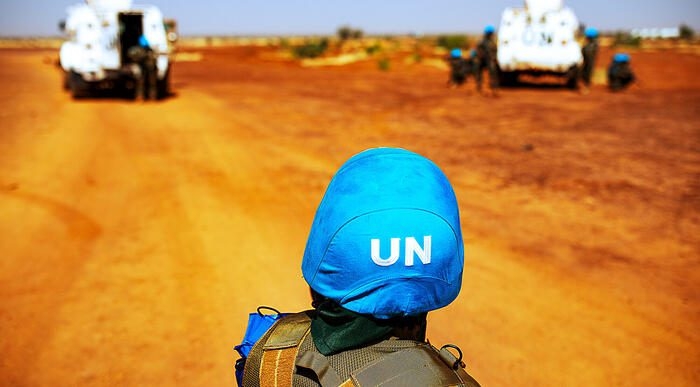The United Nations Mission in Mali (MINUSMA) has begun its exit from the country in accordance with a request made by Malian authorities to leave by December 31 of this year.
The withdrawal process involves redeploying peacekeepers and essential equipment, as well as the formal restitution of camps that had been established across the nation over the past decade.
Camp Closures and Formal Restitution
MINUSMA has successfully closed three camps at Ogossagou, Ber, and Goundam. These closures mark a significant step in the mission’s withdrawal plan, carried out in coordination with Malian authorities. The return of these sites to the state civilian authorities is a crucial component of the exit strategy, adhering to UN rules and regulations.
A Decade of Presence
The mission’s withdrawal follows a decade-long stay in Mali, where it established a total of 12 camps in central and northern regions, alongside a headquarters in Bamako. The sites were provided by the Malian authorities and are now being formally transferred back to them. This process is conducted in line with the MINUSMA Status of Forces Agreement (SOFA).
Collaboration with Malian Authorities
MINUSMA is committed to adhering to UN guidelines during the withdrawal process. The mission is working in close collaboration with Malian authorities at both national and regional levels. Negotiations for a framework agreement are underway, aiming to outline joint approaches and strategies for the transfer of camps and equipment.
Responsible Withdrawal
The withdrawal process prioritizes safety and minimizes risks. Personnel and equipment are being withdrawn from camps in coordination with the Mali government. Contingent-owned equipment, including armoured vehicles, weapons, and ammunition, are systematically withdrawn by the contributing countries. What remains after the withdrawal are essential infrastructure and equipment, such as water treatment and power generation facilities, which contribute to the country’s ongoing development.
Managing Contingent Owned Equipment (COE)
Contingent owned equipment (COE), brought to Mali for executing MINUSMA’s mandate, belongs to the contributing countries’ troops and police. The management of these resources is the responsibility of the respective contributing nations. They have the flexibility to repatriate, gift, sell, or hand over equipment to MINUSMA.
Transparency and Responsibility
Transparency is a priority throughout the withdrawal process. The removal of all UN identifiers, including logos, registration plates, and barcodes, is done before any third-party transition. Furthermore, efforts are made to leave the camps in a safe and functional state. This includes the removal of hazardous materials and waste, followed by environmental clean-up.
“The process is meticulous and respectful, guided by national and international regulations, including Mali customs, UN environmental policies and the UN-Mali Status of Forces Agreement (SOFA). Adhering to these guidelines ensures responsible handling of resources.
“All these measures align with the memorandum of understanding (MOU) between the contributing countries and the UN and adhere to Security Council stipulations. The resolution endorses an orderly, safe mission withdrawal and unhindered export of UN equipment, supplies and other assets.
“It is a testament,” MINUSMA maintains, to the mission’s “unwavering commitment to a respectful and co-operative withdrawal from Mali”.
Environmental Impact and Explosives Clearance
MINUSMA places great emphasis on minimizing its environmental impact. The mission strives to complete the environmental clean-up within the available time and capacity. Additionally, the UN Mine Action Service (UNMAS) conducts a comprehensive battle area survey to ensure that no explosives are left behind. The results of this survey are included in the documentation that is signed by the authorities.
“The formal return of camps to the Malian State is an important step in the process of MINUSMA’s withdrawal from Mali. It symbolises the end of MINUSMA’s presence and responsibility in the camp and the area it covered, as the mission seeks to hand over previously mandated responsibilities to the Malian authorities, with the possible contribution of the UN Country Team, the UN Office for West Africa and the Sahel (UNOWAS) and other stakeholders,” a statement reads.
It continues: “Peacekeepers are withdrawing from Mali, but the UN commitment to the country remains strong. The UN will continue to provide multi-faceted support to the Malian government and people in their efforts to achieve sustainable peace and development”.
Abandoning MINUSMA
Components partners of MINUSMA forces has since withdrawn most of their forces and equipment from Mali.
In June last year, the United Nations peacekeeping mission in Mali (MINUSMA), was left in urgent need of armed helicopters when Ukrainian peacekeepers left the country to join their brothers-in-arms in defending their country against the Russian invasion.
Late last year, Ivory Coast began gradually pulling out its forces and police from the United Nations Multidimensional Integrated Stabilization Mission in Mali (MINUSMA).
The withdrawal comes after former colonial power France, and then Britain pulling out its 300 troops from the peacekeeping force.
While in August 2022, France withdrew its troops which have been in Mali for more than a decade, after a dispute about Malian air space violations, and the presence of hundreds of Russian mercenaries from the Kremlin-linked Wagner Group.
Likewise, Germany withdrew after suspending its operations when the Malian government denied flyover rights to Berlins airborne forces.


